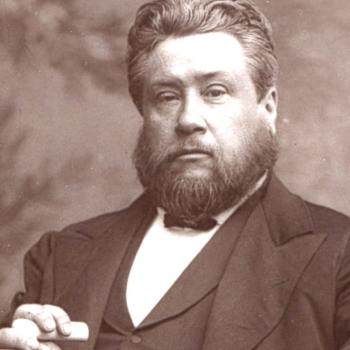How well do pastors care for those with chronic unsolvable problems?

Adrian talks with John Stevens, a leading UK christian. They spoke about servant leadership, a phrase used by Sir Keir Starmer but which ought to be deeply rooted in Church leadership. The mature Christian or pastor ought not to be remote, strong, entrepreneurial and untouchable but rather someone who knows what it is to have human weaknesses and go through human sufferings, and yet to find Christ in the midst. If you are a pastor or church member who is struggling with feeling you are failing to meet the expectations you have put on yourself this discussion will serve you well.
We talked about a lot of subjects but the concept of servant leadership held them all together. Early on we spoke about the role of the Brethren Movement in recovering team leadership and other crucial things for the whole body of Christ. We spoke about how different types of churches can help each other and that part of God’s purpose for his Church is using various types of churches to restore important concepts to the wider church.
We spoke about the dangers of putting leaders onto a pedestal where they are seen as somehow separate from others and always living the blessed life. None of us are perfect, so how can we be more honest with each other?
We discussed the health service, some of the scandals that are happening in there about bad management. talking about political leadership and why Sir Keir’s mention of “servant leadership” is a huge encouragement.
In some ways this discussion nicely complements two of my recent conversations about dealing with various kinds of difficulties, with Barnabas Piper and Dave Bish.
Watch the Interview
Listen on Spotify or other Podacast Platforms
You can also watch on YouTube
A transcription of the interview ends this article.
Background Articles on subjects we discussed
God knows about your suffering: Spurgeon on God’s Compassion
Transcription by TurboScribe.ai.
Adrian
Hi everyone, my name is Adrian Warnock and I’m here with John Stevens. John is the director of the FIEC and that’s a UK organisation. Perhaps John, you could just first of all start off by explaining what the FIEC is and what you do there please.
John Stevens
Hi Adrian, it’s great to be with you. Yes, the FIEC is the Fellowship of Independent Evangelical Churches. We’ve been around since 1922 and it’s basically an association of evangelical churches that want to support and encourage one another.
They’re churches that are evangelical, they hold to a historic evangelical confession of faith, they’re united in the core truths of the gospel. We’re a family of independent churches which means we’re not a denomination, those churches are all self-governing but they’ve chosen to want to be in relationship with one another for mutual support. We’re a network of churches that are complementarian in our leadership, so our churches would recognise that pastors and elders ought to be male but we would also want to value biblical women’s ministry.
We’re clear on same-sex relationships and regard the bible as teaching that sex is only appropriate for heterosexual relationships. So those are our defining criteria. So our churches come from a variety of historic backgrounds, so some would be brethren in origin, some baptist in origin, some congregationalist in origin, some have come out of Methodism, we’ve had some churches that have come out of Anglicanism, but they want to come together as independent churches to stand for the gospel together, to be able to work together to try to get the gospel out to more people. Our great vision is to want to see faithful Christ-proclaiming churches in every community. Today we’re about 644 churches, so we’ve grown by about 240 churches in the last 10 years.
We are a network that our churches are planting churches, so we’re seeing something like about 15 new churches planted per year across FIEC, and basically I lead the central staff team that exists to serve and support those churches. We see our role as providing help to leaders and congregations, navigating all the challenges of ministry and the culture, and especially to be able to foster relationships between local churches. So it’s really all about seeking to empower and encourage the work and witness of local churches.
Adrian
Okay, so how much variety would there be within those churches in terms of some of the other sort of areas that kind of divide us as Christians these days? I mean, for example, things like worship style, charismatic, non-charismatic, size, because some churches are very large, some are very small. Is there anything else that tends to mark your churches out?
John Stevens
I mean, there’s a degree of diversity across the churches. FIEC was founded to be diverse, so our boundary is marked by these core gospel truths, and within that there’s freedom for churches with a wide variety of expressions of ministry and views on secondary issues to belong. So we’re not an exclusively Baptist organisation.
There are churches within FIEC that would be historically paedobaptist [infant baptism] or would be dual practice and welcoming both those from a Baptist and paedobaptist background. Our churches would have a variety of different views on issues like, for example, the charismatic movement, so we’re not a non-charismatic movement. Most of our churches would probably be historically continuationist but cautious, but there is a spectrum, and certainly in the UK at the moment we have a growing number of churches that have come from a Pentecostal background, particularly those that are from an ethnic minority with the large number of diaspora churches that are beginning to start in the UK.
We would have a spectrum of theological views on issues like, for example, reformed theology, like the observance of the Sabbath, how to engage with the culture. So we’re not a monochrome group of churches. As with any group of churches, there’s a centre of gravity, so there are more churches in some groups than in others, but we want all to be welcome and our vision is to want to bring together churches that stand on those core gospel convictions.
In terms of size, there’s a diversity of size. Our largest church is about a thousand people. We’ve got a number of churches that would be in the range 600 or above, often in city centres, connecting with students and younger people.
Historically the heartland of FIEC has probably been in suburban contexts. The average FIEC church would be around 150 regular attenders, and then there are a good number of smaller churches, perhaps in rural areas where it’s quite difficult to sustain gospel ministry. So there is a significant spectrum of size of churches.
Over the last 10 to 15 years, actually we’ve had an increase in the number of larger churches and medium-sized churches. One of the things that’s hugely encouraging me at the moment is on the ground, many churches are growing. After COVID, we’ve seen congregations grow, more people come in, more conversions.
So particularly medium-sized churches and larger churches that are in bigger urban contexts are seeing significant growth at the moment, and we’re really encouraged by that. Again, in terms of worship style, that’s a matter for local churches. They will sing a range of different material, so there are some churches that will adopt a more liturgical emphasis, which would perhaps emphasize kind of historic hymns, through to those that would be at the more contemporary end of the spectrum, who would be predominantly singing sort of modern and contemporary worship songs.
The reality is most of the churches would be a blended mix of that. If you want to think about the average FIEC church, it’s pretty middle of the road. To use a radio analogy, most of our churches are sitting somewhere in the kind of Radio 2 sort of space, rather than a kind of a narrowly Radio 1, or a trendy Radio 6, or an intellectual Radio 3.
They’re wanting to draw together a broad group of people around a central gospel vision.
Adrian
Yeah, and as you said, I know a number of your churches come from different sort of historical backgrounds, and from a family point of view, I know for me a number of the Brethren churches, which was a huge part of my family, not really my, well, my parents grew up in that, both of them, and some of them I think have sort of subsequently maybe dropped the title Brethren and become part of the FIEC. I’m right about that, aren’t I, John?
John Stevens
Yeah, in many ways the founding churches of FIEC came from a Brethren background. In 1922, the original churches, there were just 18, tended to be Mission Hall and Brethren churches that were concerned about Brethrenism at that time becoming too tight. In many ways, I think the Brethren are a much neglected group in UK evangelicalism.
They were really at the forefront of maintaining the gospel in the late 19th century, and on into the 20th century, they were a very active church planting group, and I think had a vision for plural leadership and a vision of ministry that lots of churches have learned from. And many FIEC churches have come from a Brethren background or have been influenced by Brethren church thinking. Then in the 20th century, particularly after the 1950s, churches that had been in other denominational groups began to leave those groups because they were concerned about theological drift, and so those churches found a home in FIEC as well, which is why we’re now today a relatively diverse group of church hymns.
Adrian
Yeah, so I mean, one of the things about that then is, I mean, you know, you’re absolutely right, and I can’t agree more with this idea that the Brethren churches were quite important, and I actually wrote about that quite recently, in fact, and my grandfather was very involved in that and was one of those counties evangelists and preachers and went around helping to plant some of those churches and give strength to some of those churches. So it’s exciting to realize that whilst, you know, the name Brethren might not be used very much now, but also they regained some of the things that you talk about.
A lot of people would argue they were the first people to really say that churches should be led by a team of leaders rather than just one pastor and body ministry and a few other things like that. I mean.
John Stevens
I think that’s absolutely right, and lots of independent evangelical churches and even other churches in denominations now reflect in their ministry practice and their leadership structure things that were first taught by the Brethren. I think the Brethren in many ways had this significant influence, and at one level the reason why Brethrenism as a movement has declined is partly because the key things that they stood for have now become normal in a wide variety of different kinds of churches. They were unique when they evolved in the 19th century, but others have recognized that some of those fundamental ideas are in fact more reflective of biblical practice.
So within FIEC, churches coming out of a historic Baptist background tended to have a model of leadership of a sole pastor plus deacons, but in the 1970s there was a move towards having plural elderships, much more on the Brethren model, and that would now be normative for the vast majority of FIEC churches. I think another area where the Brethren had significant influence was the importance of gathering together for the Lord’s Supper and making that a central part of the church’s life. Again, perhaps non-conformist churches in the past would only hold communion on an irregular basis, maybe a small number of times a year, and it was seen as a high point of the church’s life, whereas the Brethren, I think, communicated the idea that this was the normal gathering of the people of God as they came together to remember the Lord’s death and resurrection, and again that has become more normative in churches. I think that fleet of foot ability to church plant because they didn’t require paid ministers, again, is something we can learn from.
One of the challenges, I think, for reaching the UK with the Gospel, when we’re only about two or three percent evangelical believers, is that if we’re going to get churches planted in all the communities that need it, we simply don’t have the financial resources to be paying full-time ministers and staff to be planting churches. The Brethren pioneered a model of bivocational ministry, which I think is absolutely essential if church planting is to explode, to be able to meet the need on the ground. So, in many churches and denominational contexts, church planting is significantly limited by the ability to raise up paid workers and provide the resources.
I think the Brethrenism showed that that isn’t essential to the planting of churches and the getting out of the Gospel.
Adrian
Yeah, no, that’s really good, that’s really, really good. So, I’ll put a link to my article about Brethren below this for people to have a look at that, but I think there’s a whole general point about that, isn’t there? There is often these movements of God in restoring to the church things that were lost, you know, and obviously most people think about the Reformation in that, and of course that was a huge part of that, but when you look back at the Reformation from our standpoint, often people will look at the things that weren’t rediscovered at that point, but obviously, you know, we can have a blind spot, can’t we, to all sorts of things, and we just need God to restore these things through illuminating the Scriptures, usually, and actually allowing churches.
Initially, often these movements are rejected. I mean, of course, the Reformation, many of them were killed and burnt at the stake, but even the Roman Catholics say now that they want to believe some of the things the Reformation believed, and so there is that sort of spreading that goes on with these various movements, and that’s the way I see church history. I don’t know if you think that’s a fair way of looking at it.
John Stevens
I think so. I would draw a distinction between in every generation there are movements and there’s mainstream, and it seems that raises up movements in each generation that identify things that the church is missing, they become correctives to the church, they might be critical of the church, they’re often operating outside of the church, and they set up new churches, they set up new gatherings of ministers, and that often helps the mainstream churches to recognize things that they have been missing. Very often what happens is the things that are identified by the movement are then ultimately incorporated into the mainstream churches, which change.
Sometimes the movements begin more extreme, and they become moderated over time. The mainstream churches absorb those insights from the movements, and very often the mainstream churches, I think, fail to acknowledge that it’s the movements that have influenced them and have shaped their ways of doing things, and there’s this, I think, helpful synergy between the movements where God perhaps reminds his church more generally of things that it’s missed, but how that moves into stability in a way that endures through the generations. Movements very often are one or two generational phenomena. They’re very difficult to sustain into the longer term, so it’s the feeding from movement to mainstream that enables the church to persist and continue from generation to generation.
Adrian
Yeah, and I guess, you know, in our lifetime, yours and mine, one of the main sort of movements like that has been the charismatic movement, and a lot of, even churches that wouldn’t say, you know, that they’d be influenced by the charismatic movement actually have been, haven’t they?
John Stevens
Oh absolutely, and I think it’s more complicated than that because I think that the charismatic movement was partly a discovery of some particular gifts. It was also an emphasis on a more experiential model of Christianity. I think in the late 19th century, 20th century, there was a tendency to move towards a more rationalistic form of Christianity that was bound up against the reaction against liberalism, and I think there was a fear of emotion and subjectivity.
So actually, some of our evangelical forebears were much more open to God working in particular unexpected ways, but I think in the late 19th century and 20th century, there had become great suspicion of that. So the charismatic movement, building really in some ways on cultural changes that happened in the 1960s, both led to a recovery of ways that God might work by his Holy Spirit, but actually an emphasis on the subjective personal experience of God, that it’s not just doctrine, and I think that theologically part of what was going on there is a recognition that the case for cessationism that dominated across Protestantism and evangelicalism just simply wasn’t particularly biblically founded. So the idea that Romans 13, that prophecy was going to cease, tongues were going to cease, and that this was the closing of the canon and the end of the apostolic age. I think careful examination of those texts suggests that that is speaking about the end of this current age, they’re eschatological rather than connected with the apostolic period.
So I think the charismatic movement also prompted a significant rethinking of the work of the Holy Spirit and how the Holy Spirit might work today, and certainly within my more conservative evangelical context, theologians like Jim Packer, John Piper, Don Carson, I think helped conservatives to think about the charismatic movement differently. At the same time as I was talking about movements, I think there were some radical elements to the charismatic movement that again have come to be refined, and those that have come from a charismatic perspective have perhaps begun to take more seriously some of the teaching in the New Testament about the need to test everything and about the way that gifts ought to be used in the life of the church in an ordered way to be edifying and building up the body.
So again I think both sides have learned from each other and that leads to a more mature synthesis.
Adrian
Yes that’s right, and I guess this is where movements like FIEC, and also I mean we perhaps ought to talk a bit about Affinity because I know you’re involved with that as well and what that is, but also just local connections between churches in a town that may not have some kind of official organisation, but pastors helping pastors, churches learning from each other. I think there’s a large degree of safety that comes in that, and I know one of the things I did want us to just touch on was this whole idea of leadership and how churches keep safe, both doctrinally but also in terms of leadership style and such like, because you’ve talked about movements and church planting and new churches springing up, all too often I think we’re looking actually for a certain type of person to do that.
They’re very charismatic, not necessarily in the Holy Spirit, but just in terms of having a strong personality, maybe entrepreneurial, people want to follow them. There’s a high degree of tendency within Christian circles of all types I think to put people on a pedestal, whether that’s just in your little local church on a pedestal or whether that’s on a national or international pedestal of this is a great leader. And sadly, without perhaps getting into details of some of this, we’re seeing a lot of these people fall, whether that be through moral failure or more specifically through failure that in a sense comes from the very strengths of those people, of their strong desire to do these things for God and be strong and get people working in the mission.
And sometimes that can lead to perhaps, well, what some people even call spiritual abuse, but certainly can be overly controlling, overly scary, overly. I mean, even going back many years was the heavy shepherding movement, for example, as well, wasn’t it? So I just wonder if you’ve got any thoughts about how, you know, relating together churches can actually protect from some of these things.
John Stevens
I think you’re absolutely right. And there have been a series of revelations of sort of both appalling abuse on the part of some leaders and in some cases, very unwise leadership that is overly controlling what Jesus might describe as lording it over others rather than serving others. I do think that relating to one another at a local level is a way of helping leaders to keep humbled and grounded.
I think despite all of those problems, we shouldn’t forget that the vast majority of local church leaders are not abusive. Most of them are unknown, humble servants who are getting on with the task and work of caring for God’s people and proclaiming the gospel to their communities. So although there have been high profile failures, I don’t think we should lose sight of the faithfulness of the vast majority of local church leaders that nobody has ever heard of.
And they are getting on with the job. And I rejoice in that. But I think you’re right.
I think that so much of it is to do with evangelicalism, our desire to achieve success. And that’s particularly prevalent, I think, in a context in which the church has declined, in which there’s a sort of a real sense of the need to recapture the culture, to reform the church. And that tends to put a premium on Christians giving their loyalty to those who appear to be able to deliver success.
And very often that requires people who are pioneering, people who are entrepreneurial, people who are able to get things done. And sometimes we can value getting things done, even if that is at the expense of the way that people are treated to achieve it. I think the sadness there is that we can easily prioritize success and achievement over character and reflecting the Lord Jesus.
And therefore, leaders tend to become high profile who achieve that sort of level of success. So I think we just need to go back to the Bible. We need to go back to what Jesus says about leadership.
We need to go back to what other character qualities required for leadership. We need to be willing to allow the church to grow at God’s speed, in God’s way, and not to be so driven by a desire to achieve measures of success. I think Francis Schaeffer is very helpful there in reminding us that we’ve got to do the Lord’s work in the Lord’s way and trust him that his purposes will be accomplished.
But yes, keeping one another accountable, keeping one another aware of reality, is a hugely important way of guarding ourselves against those dangers.
Adrian
And, you know, we talked about servant leadership, didn’t we, when we were sort of setting this up. And it was a funny sort of way that, in a way, this started to, this whole interview came about, was it was really through me reading something you’d written about our UK election, and then republishing it on my site. And how, you know, something that had been said can speak into this kind of leadership process.
John Stevens
Yes, that’s right. I mean, I was quite struck by Keir Starmer’s first speech as prime minister, in which he said that his purpose of his government was to serve the people. And that was very noticeable.
That was the tone that he took. Again, I was struck by the contrast with that with the Labour victories sort of in the past. I think it was back in 1945, where after Churchill was defeated, some of the Labour supporters declared, we are the masters now.
And how different it is for someone to say, we are the servants now. And I think that reflects very much a Christian understanding of what leadership is all about. And of course, that’s nothing new in the secular world.
Within management, people have spoken about servant leadership for decades. And in some ways, they’ve been learning the very principles that Jesus was teaching. So I thought it was quite striking that Sir Keir Starmer, who’s an atheist, was speaking in terms that Christians would recognise and that reflect Jesus’ teaching about leadership.
And that is the fundamental principle that Jesus sets out for his disciples. He’s come not to be served, but to serve. It’s not about gaining acclaim.
It’s not about gaining status. It’s not about gaining privilege. It’s not about achieving what you want for yourself or your small group.
It is about genuinely seeking the best good of others and being willing to sacrifice yourself for them. Now, of course, Jesus is the one who shows us how to do that in his death on the cross. And he is the one who, by his spirit, empowers and enables us to lead in that way.
I think the challenge for Keir Starmer and any secular leader is without that spiritual model and without that work of Christ in them, it’s very difficult humanly to maintain servant leadership. But that is what Christian leaders ought to be aspiring to. It’s what we ought to be praying for.
It’s what we ought to be looking for in the leaders that we appoint.
Adrian
Yeah, I couldn’t agree more. I do think that Christians so often almost don’t care enough about politics or care too much about politics. I don’t know if you’d agree with that assessment.
John Stevens
I think that’s right. And I think that the confusion for Christians is how they see the mission of God working out in the world. So it seems to me there are two opposite dangers.
One is to think that the mission of God and building the kingdom is primarily accomplished through political means. I think that flows from an understanding of the kingdom of God as being a transformed society, a greater external righteousness and morality within a country as a whole. And I think if that is your view of what the kingdom of God is, then, of course, politics will seem a very significant means of achieving that.
The other is a pietistic approach, which says the kingdom of God comes exclusively through the church. The church is only really to be concerned about evangelism and therefore politics is part of a corrupt world. And as Christians, we shouldn’t engage with that.
I think actually neither of those reflects the biblical sort of pattern. It seems to me that biblically the kingdom of God does come through the church and the preaching of the gospel, but it has an impact in the wider world. We are to be citizens of the world as well.
God has a purpose for government in restraining evil, in doing good. And we ought to, in as far as we are able to, support and promote that. In a democratic context in particular, we have the option of choosing who rules and governs.
We have the option to lobby, to campaign, to protest, to write, to express our opinion, to engage. Again, in many autocratic regimes and in the ancient world, that wasn’t available in quite the same way. So I think we have a responsibility as citizens to avail ourselves of the opportunities that we have to seek to do good within wider society, to commend Christ, but without expecting that that is the means by which the kingdom of God is brought about.
Adrian
I like that. I like that sort of sense of balance you have there. And of course, that does also have an influence on the political views of Christians as well, because I think often, certainly even in this country, but especially in the US, Christians are perceived as being by default very right-wing and can even sort of trumpet certain types of leaders who, perhaps going back to what we were talking about, might be very strong, might be seen as being very charismatic and fighting for certain causes that perhaps Christians in many cases might believe in.
And yet somehow the character isn’t quite there of this servant leadership of Jesus. And it worries me a little bit that both in churches and in the world, we’ve been looking for leaders who are perhaps not really like this servant nature that Jesus is talking about.
John Stevens
I think there are a couple of issues bound up there. I do think it’s difficult for Christians engaging with politics, because I’m not sure that certainly in a British context, any of the political parties represents a holistic Christian vision or something approximating to it. So I’ve been reading through the book of Leviticus recently, and I’ve been so struck by the fact that the book of Leviticus is both concerned about personal sin, sinning, sexual morality, those kinds of issues.
It also has a massive concern for care for the poor and the vulnerable, for equality in society, for protection of those who are poor against economic exploitation. So you’re not allowed to profit from the poor. And I think a biblical vision holds together both of those things.
There is both a concern for justice and equality between people. There is also a concern for individual personal morality. And the way politics is developed in the West is those two things tend to be separated.
So there tends to be a difference between social conservatism and economic conservatism. So in Britain in particular, Christians, the evangelical body as a whole is actually slightly left of center. So the recent evangelical alliance survey would have suggested that a majority of evangelicals would have voted for Labour in this particular election, motivated by issues of social justice concern and the problems of poverty and inequality within society.
So a majority of evangelicals in the UK have made the option that the least worst government, as it were, is going to be the Labour government, and those are their priorities. And maybe they think that on the social areas of individual morality, there’s not a great deal to choose between the political parties. A smaller number have supported the Conservative Party.
I think there is often a very vocal support for particularly individual moral issues, which are not unimportant. Abortion, euthanasia, sort of freedom of religion, issue of women’s rights and protecting women’s spaces. I think those are all incredibly significant issues, and it’s right to be concerned about them and bring them to the attention of government.
I’ve written to Keir Starmer and my MP raising my concerns about some of those issues and how those might develop. But I think there’s a recognition that no party in a sense holds those things holistically together. So one of the interesting changes in the UK is how liberal progressive the Conservative Party has become over the last 40 years on those issues, which I think makes the choice for Christians more difficult.
And of course there’s a reality that there are evangelical Christian politicians in all parties. So there are evangelicals like Danny Kruger, like Tim Farron, like Stephen Timms, who are part of the different political parties. So committed evangelicals feel that they can support and work in the different parties that are available to us.
So I think the UK is slightly different. UK evangelicalism and Christianity has, I think, a much stronger concern for the achievement of economic equality, the overcoming of inequality and disadvantage in society, and believes that government has a role to play in that. And that’s been a long tradition in the UK.
I think it’s quite different in the States, where the evangelical vote is very much more conservative, both socially but also economically. I think for all sorts of historic reasons, the American…
This file is longer than 30 minutes.
Go Unlimited at TurboScribe.ai to transcribe files up to 10 hours long.
John Stevens
Sort of dream the idea of kind of economic liberalism, individualism, the ability to be able to succeed yourself. That is a very different culture to that that we’ve experienced in the UK, which I think explains why a much larger number of American evangelicals are attracted to the Republican Party, both because not necessarily social conservatism, but also because of the economic position that it holds.
Adrian
Yeah, no, I think that’s right. And I think I think there’s also a lack of understanding sometimes of the need for a safety net. You know, I mean, issues like health is obviously it’s a very personal thing for me because, you know, the NHS has saved my life, you know, and I noticed online that, yes, there are some American centres of excellence for health.
But but those require you to have good insurance, maybe to be in one of the cities. But when I speak to people online in some of the little the smaller places, especially or people who haven’t been able to afford insurance, I mean, you hear all sorts of horror stories about people, you know, not getting the treatment that they need and literally dying because they don’t have enough money, which is something that hopefully wouldn’t happen in the in the UK or at least hasn’t historically happened.
Although, you know, the NHS is in a bit of a mess right now. It does feel that that’s better than the alternatives, personally.
John Stevens
I think it’s complicated in the sense that I think in America you have actually the highest level of health care is available, but it’s not necessarily available to all for the very reasons that you say. One of the challenges we have in the UK is that the NHS model as it works at the moment, it can deliver that care. I have a friend who’s undergoing treatment for cancer who is receiving care that in America their insurance company wouldn’t cover, but the NHS is spending a fortune.
And that I think is a great blessing. At the same time, because of the way the NHS works, there are lots of people on waiting lists who may not be getting treatment. There are those who will die without getting treatment because of the way that the system works.
So I wouldn’t want to say that the NHS and the US are in a sense ours is ideal and theirs is problematic. And I think that Wes Streeting, the current health secretary, is obviously looking at questions of how the NHS needs to be changed. And there’s a multiplicity of different models as to how to deliver health care.
So the model in France operates slightly differently, but seems to deliver overall better results. The same is true of Australia. And I think there’s a challenge of if the fundamental objective is health care free at the point of use, how you deliver that and how you manage that can be done in slightly different ways.
I think our fundamental commitment to provide care for everybody, irrespective of their needs, is a good and a right one. Whether the NHS quite operates in the way that does that with its mix of private, public, insurance, not insurance, I think is a matter for debate. But that fundamental commitment that everybody ought to have access to treatment irrespective of needs is, I think, a particular characteristic of Britain and social democracies.
In America, there might be a safety net, but there isn’t quite that same commitment to providing health care for absolutely everybody at the same level.
Adrian
Yeah, I think you’re right. The other thing, of course, about the NHS is about leadership. And it is interesting to see what’s being said already by Wes Streeting, you just mentioned him.
And that is that on day one, he declared that the NHS was broken, which is something that has not typically been done. And he said it’s now the official policy of their department that the NHS is broken and needs to be fixed, which is quite interesting. Because certainly, for example, during the pandemic, I personally found as I was trying to battle for some things for some of the people like myself who are immune compromised and were struggling to get certain things out of the NHS, there was a kind of arrogance about the reactions where they couldn’t possibly have made any mistakes.
And unfortunately, there’s a growing kind of scandal that I think because of the election has been lost a little bit around, which is very similar to what’s gone on in the post office, unfortunately, around people who whistleblower saying there are problems that there’s been issues needing to be resolved, actually finding that the management, as it has at the moment has actually, you know, victimised them and investigated them and even fired them in some cases.
And I think we’re going to be hearing an awful lot more about that. And it seems like Wes Streeting is kind of quite determined to change the culture. I don’t know if you saw after his recent meeting with the doctors around trying to solve the strike issues.
He said that one thing that he’s angry about, he said, is the way that the NHS treats them. And certainly, I know people who work in the NHS who say it’s actually one of the worst employers in the country, which isn’t right. But that comes from leadership right from the top down, I think.
John Stevens
I think you’re right. Actually, interestingly, I think there are two lessons for Christian leaders in that. I think in the British political system, it is easier for the Labour Party to reform the NHS than it is for the Conservative Party.
The Conservative Party has a reputation for being opposed to the NHS, and that makes it politically toxic to consider significant changes. So in the same way that, for example, it’s easier for the Conservative Party to reform defence or cut defence spending or whatever, because that’s seen as its kind of area of expertise and concern. In a strange way, it’s actually easier for the Labour Party to be more radical in dealing with the NHS.
Tony Blair, to some extent, did that in 1997. Whereas for the Conservatives, they are simply attacked and accused of privatising. So I think that the fact that West Streeting says it needs to be addressed is a good sign.
And he probably has the political ability to be able to do that in a way that previous Conservative health secretaries didn’t. The lesson for us as Christian leaders is in church life, there are often problems that are untouchable in church life, maybe because of who we are, because of our convictions. Actually, we’re not, we don’t feel that we’ve got the political capital to tackle known problems, because of how people will respond.
Real leadership is the willingness to be able to grapple with known problems that are there and to seek to put them right. So I think you’re right, there is a real desire to sort of put things right and name reality and deal with it. I think the other issue you raise is also absolutely right, that often institutions and organisations have a culture of wanting to suppress the truth of the reality as what has happened, to hide, to cover up, to self-justify.
We’ve seen that with the Post Office. We saw that with the infected blood scandal. There’s another scandal unfolding at the moment in the defence arena about people who’ve developed cancer because of exhaust jets from helicopters.
Significant number of pilots and crews have been diagnosed with cancer. There’s just the beginning of potential admission that that is because there was a failure to protect them. Again, doctors who whistleblow find that their careers are affected.
And it’s all about defending the image of the institution. And again, we have seen that sadly in churches, that where pastors have failed, where there’s been bad practice, where people have known about it, often the first instinct has been to cover up and protect the reputation of the institution rather than to listen to the whistleblowers and consider carefully whether or not what they’re raising is real and requires remedial action. So as Christians, again, I think we need in our churches and organisations to be able to listen to those who are raising concerns, identifying abuse, to properly investigate that and then to take the action that is needed.
I think one of the good things that’s come out of some of the leadership abuse scandals is more churches, more organisations have put in place proper complaints procedures, proper whistleblowing processes that at least mean that there is an opportunity for people to raise those concerns. And organisations are aware now of the reputational damage of doing nothing and are more willing to act.
Adrian
No, I think you’re absolutely right. And I think that’s a fundamental thing about identification of leadership and authority almost as an other and separate from the people you’re following. That’s one of the things that’s been a bit of a problem.
I remember even for me as a doctor, when I worked as a doctor, I had this funny mentality that I wouldn’t get sick. And I’ve had a lot of this since I’ve become a patient. I’ve been very, very involved with, you know, hospital stays and, you know, being taken to and from hospital by hospital transport, having chemo, all the rest of it.
And it’s amazing how many people have said, oh, you know, because my notes call me doctor still, you know, because that’s my title. And they were like, oh, we thought we were picking up a doctor for the clinic. We didn’t realise that doctors could be sick too.
And it really made me think, because I think sometimes, you know, that is part of the problem. You have a kind of class of people who consider themselves superior, who are helping those people down there who are suffering without really understanding perhaps the compassion and the understanding that we’re all in this together. And actually, we’re all broken.
We’re all in need. We’re all, you know, and we can all need. And I guess, again, going back to where it’s treating, the interesting thing about him is he actually had cancer as well, and he was a cancer survivor.
So I guess he’s experienced what, you know, what the NHS can do at his best. And he was very fortunate to not have to wait on a long waiting list to have had that cancer diagnosed very quickly and very early and to get the treatment he needed. And so, you know, maybe that’s one of the things that will help him, hopefully.
Let’s pray for him that it does as he comes to try and tackle some of these cultural issues. So look, you know, it’s not us, be them. It’s not this group up here and this group down there.
And let’s all be very professional and not have compassion for those who really are in need, because the truth is any of us could need the NHS in one moment tomorrow.
John Stevens
I think that’s absolutely right. And again, for Christian leaders, it’s important that we remember we are, first of all, sheep, not shepherds. Jesus is the chief shepherd.
We are the under shepherds, but primarily we are sheep like everybody else. And I think a sharp division between leadership and God’s people is massively unhelpful and ultimately corrupting. To some extent, that is seen in the division between clergy and laity that emerged in the Catholic Church and to some extent continued after the Reformation, even though the sacramental element was removed, that sense of a special cast of pastors and elders who were different and distinct.
I think that happens with concepts of anointed and apostolic leadership. Some individuals are seen as being set apart by God and therefore untouchable and unaccountable. And in many ways, it’s back to what we were speaking about, about the brethren, the brethren recognised that there isn’t this sharp distinction between clergy and laity, that those who lead are simply those within the ordinary body of the people of Christ that have been gifted for their task.
And it’s a responsibility that they carry. It doesn’t make them special. It doesn’t make them different.
But I think we also have to recognise that very often it is actually the Church, it’s God’s people, the congregation who want this anointed leader. So there are some leaders who aspire to that position because it brings them power, privilege and prestige. They want to be better and superior.
And I think the Bible warns us against appointing those kinds of people to position. But at the same time, very often congregations want a superhero. They want someone who will be superior to them because they think that that is what will enable the work to be done.
They want to look up to somebody. In effect, they’re wanting their leader to be Jesus to them rather than coming to Jesus himself. So I think sometimes it’s ironically congregations that can create the problem.
It’s not necessarily the leader puts themselves on a pedestal, but the congregation desperately wants the leader to be on a pedestal. And again, here the example is Jesus. You were talking about doctors experiencing sickness.
I happen to be reading Hebrews yesterday, which speaks about Jesus, the great high priest. One of the things that’s so striking is the way the author of Hebrews speaks about Jesus being the one who became fully human, became weak like ours, was tempted in every way as we are. And the result of that is he is able to sympathize with those who are struggling and those who are being tempted.
Jesus’ humanity, his willingness to step into our experience to live a real human life, is hugely important in terms of his approachability, but it’s also his humility in action. He knows what it is to be human. He knows what it is to be tempted.
He knows what it is to suffer. He knows what it is to be hungry. He knows what it is to grieve.
He knows what it is to love. He knows what it is to be beaten. He knows what it is to die.
All of those are crucially significant for Jesus’ leadership. And I think there’s a real lesson therefore as Christian leaders. I think we can sometimes as conservative evangelicals be a bit suspicious of the idea of incarnational ministry, but there is a very real sense in which being genuinely alongside people and sharing their experience is exactly the way that we avoid that sense of setting ourselves on a pedestal as if we are different and exempt from ordinary human weaknesses and exempt then from ordinary human suffering and ordinary human life.
Adrian
Now, I think you’re right. And I think one of the challenges there is that we have like this idea that our leaders should be sort of the blessed life, you know, that come to Jesus and all your problems disappear. And so surely that means if we have a leader, then they don’t have problems and they sort of rise above and glide through life on some sort of…
And it’s an interesting thing because even in churches which wouldn’t teach the prosperity doctrine and all of that explicitly, there is often this expectation that God will look after us and that God will bless our lives and that we, especially if we’re serving him, we won’t experience brokenness and pain in our lives, that we’ll somehow be immune from the temptation to sin, that we won’t really need to sort of say to somebody, hey, I’m struggling in this area.
Can you help me? Because I’m worried that I’m going to fall. I mean, a lot of pastors, I think they feel if they were to say that to anyone, you know, that would be it.
They’d be fired. And even actually things like just ordinary human frailty, you know, somehow we don’t expect them to get sick. We don’t expect them to have to take a day off, you know, because I don’t know, something’s gone wrong or also just…
I mean, it’s really interesting when you look back to people like Spurgeon from previous generations, he took months off sometimes because of struggling with physical pain and also emotional pain from depression. And I don’t think many pastors would be able to do that today and survive with their jobs. It does worry me that we’re creating this class of sort of superhumans and then looking for any opportunity to pull them down.
It’s not good.
John Stevens
I think that’s right. And I think it highlights a number of problems there. I think there is this assumption that the mature Christian life is going to be blessed in every area.
And that’s nothing new. If you go back to the 19th century with the growth of particularly nonconformity, people were building bigger church buildings because they thought that was a sign of God’s blessing. The pastor often had the biggest house in the community and lived at a level above their churches, wanted their pastors to have this kind of status and significance.
You see that in some church contexts where, again, the pastor has to have the Rolls-Royce or the BMW or the Mercedes because that’s a sign that they’re successful and they’re God’s man ministering in that situation. Again, Christians can often create that sort of expectation. It’s ironic that Paul boasted not in all that he had, but in his sufferings and what he endured.
So, you know, two Corinthians, his signs of a faithful ministry are the numbers of times he was beaten, shipwrecked, starving. He could talk in Philippians about times when he was kind of well-supplied and times when he had nothing. So that material success and health, I mean, he’s talking about his thorn in the side, which the Lord didn’t take away.
I think there’s a real danger in a prosperity gospel that suggests that tangible, physical, material blessing is the sign of faithfulness to God and is the sign of being God’s leader. But that other issue, I think you’re also absolutely right on, is how hard it is for leaders to be vulnerable with others and to seek their support, their help. And to be honest, I think leaders find that incredibly hard to share their struggles, their difficulties.
They feel that they have to match up to the congregation’s expectations, that they are somehow letting people down. They feel that vulnerability. If people really knew what I was like and how I’m struggling and challenges that I’m facing, would they really want me to be their leader?
And I think that’s probably because we have a lack of honesty and reality about the Christian life, both as church members and as leaders. We want to project this image of success, happiness, everything being kind of easy. I mean, one of those things that kind of gets my goat is pastors.
So often, you know, their picture is them, their beautiful wife, how lovely their family, how lovely their marriage is. And if you don’t think actually the reality is for all of us, these things are struggles and have difficulties. But we project this image of perfection, which we kind of think the world wants to see and often our people want to see.
We do need to get over that. One of the really interesting things in the Bible about the disciples in particular is how honest it is about their failings. Yes, they are publicly acknowledged and they are very, very real.
So you see a humanness to the failings of Peter, James, John and others. Maybe a dimension of this that’s significant is I do think we live in a culture and in a church where although we believe in grace, we don’t practice grace. We’re not forgiving.
So when people fail, we find it almost impossible to recognize that they have repented, that they have learned to let go. And where we have a graceless culture in which there is no real forgiveness, in which sin is in some ways treated as more serious and more enduring than the way God treats it. Then, of course, we have a culture in which we’re able to be honest with one another.
So I think it’s mutual. We don’t really believe in grace. We don’t practice grace.
Therefore, we don’t have communities of grace. Therefore, we basically present an external image. And that ultimately was what the Pharisees did.
I think that ought to be a warning to us.
Adrian
Yeah, no, I think you’re right. I mean, there’s this idea in the Pharisees, isn’t it, what Jesus is about? You put a burden onto people and then don’t even help them to carry it.
And I think this burden that many pastors feel, and it might be that there’s one or two pastors watching this right now who are at the point of tears and feeling that they’re vulnerable, they’re weak, they’re not coping. Maybe the church isn’t growing, or maybe it is growing and it’s growing too much. And secretly, they wish there were less people coming because it’d be less work for them.
And they could be in a right old mess, maybe having struggles, maybe they’re feeling sick, maybe anything could be going on in their lives. And yet they feel that if they open up about being vulnerable, if they let people see that they’re weak, if they don’t. I mean, there’s this whole thing about responding to adversity in the right way as a Christian sometimes as well, that we often say, oh, look at that, they’re handling it so well.
And I remember for me, there were times when I was sick and some of the other challenges I faced recently, but I wasn’t handling it well. And I had to get to the point of, well, it’s okay not to handle it actually for a while. Sometimes it’s the dark night of the soul, sometimes God feels very distant.
Sometimes we feel angry with God. Sometimes we’re in our prayers, God, why aren’t you answering my prayers? I remember even saying to God at one point, God, I wouldn’t let my son go through what I’m going through right now.
Why are you letting me go through this? And these kind of honest conversations with God even, let alone with each other, are often the exception rather than the rule, I fear.
John Stevens
I think that’s right. And I think for pastors and leaders, again, it’s really important that we distinguish out. There are some sins that are disqualifying for ministry.
We need to recognize that. But that is not true of necessarily all sin or all failing. So all of us are sinners.
We all sin in multiple ways. Not all sin is disqualifying. So there’s a category of sin that is disqualifying because it reveals that you don’t have the character that’s appropriate for ministry.
Then there are areas in which basically we lack wisdom and experience and maturity, and we might have messed up and we might have failed. But that’s something from which we should learn and seek to get better. And that’s where we need a measure of forgiveness and a recognition on the part of the community that we’re not perfect, that we are works in progress.
I think pastors feel that their failings will be put into that category. There’s a third issue, which is really just simply human weakness that we experience, which is part and parcel of the human condition. Our physical state, our emotional state, our mental state, our capacity, those change over life.
They change with the circumstances in which we find ourselves. So I think it’s really important for pastors to see and churches to see that those are different things that need to be regarded in different ways. I think we’re often not very sophisticated in doing that.
And again, biblically, we tend to think what we need is a strong man to lead. And that’s exactly what the Corinthians wanted. They wanted people who were externally impressive.
They thought that that’s what was good for the church. Actually, Paul says, actually, it’s when I’m weak that I’m strong because that’s grace of God is at work in me. What we need are people who are real, who recognize their weakness, but in that weakness, experience the strength and the grace of the Lord Jesus and testify to it.
Adrian
Yeah, I think that’s beautiful. And I think that’s the thing. If you’re struggling as you’re listening this and thinking, oh, I’m in danger of failing as a leader or just failing as a Christian, actually, that can be the point where God can meet you the most.
And there’s a verse that I’ve clung on to a lot. And funnily enough, I wrote about this verse before my own sort of personal, you know, few years of challenge and test happened, which was from Corinthians, where it talks about, I think it’s two Corinthians, where it says that God is the God of all comfort and he comforts us in all our troubles. You know, so it doesn’t matter what trouble someone who’s listening to this is experiencing.
God is there and it doesn’t feel like he is sometimes. He can feel a million miles away, but he comforts us in all our troubles in order that we can comfort others in all kinds of troubles. And one of the things I found was that unfortunately, some Christians weren’t that helpful when I was when I was at my low points.
They didn’t seem to know what to say. They had twee things to say. They had unhelpful things to say or they just had nothing to say.
And so they ran a mile. But some Christians were there for me. And often it was the ones that had been through some kind of major difficulty, not necessarily sickness and other things I was facing, but actually might have been something different, you know, some other major challenge that they’d been through and had met God and found God in the midst of it.
And they weren’t judgmental. They didn’t say to me, oh, you’re handling this the wrong way, Adrian, you should be more mature or something like that. They just sat with me, you know, and listened to my complaints sometimes and maybe prayed with me or maybe just showed me some love and some acceptance.
And I think, you know, those are often the real wonderful pastors that we should be promoting, if you like, and looking to people who’ve been through something, have been touched by the fire, as it were, and yet God has met them in the midst of that difficulty.
John Stevens
I think that’s exactly right. And again, like you, I’m conscious there are many pastors out there who are struggling. I’d want to encourage them to speak to somebody.
I think pastoral ministry can often be very lonely. It’s so important to have people that you can speak to, whether in the church or outside of the church, that you can be honest with, that you trust, that love you. Ideally, that’s with your elders and your leadership team, but it might be those externally.
I’ve benefited hugely from lifetime friendships, a minister’s fraternal group that I meet with regularly, people to be able to turn to and talk about honestly what is going on, who will help you. And we shouldn’t be ashamed, to be honest. I think actually, if we’re struggling and are not honest, that’s actually when the problems get worse and worse, and they then often blow up.
Pastors often fall because they knew something was wrong, but they didn’t do anything about it early enough to address that issue. From the perspective of congregations and leaders working with pastors and others, we need to really care for our leaders. I do think that the majority of leaders are under significant pressure.
Most pastors are not lazy people. I think overwork is far more of a problem than underwork. I think most pastors feel inadequate about the results and the fruit of their ministry.
They have deep questions as to why they haven’t been more fruitful, why they haven’t seen more conversions, why they haven’t seen more growth, and they carry that burden with them. I think encouragement is hugely needed for leaders. The proper taking of time for family, for holiday, for personal refreshment.
I’m constantly shocked by leaders who don’t have a personal devotional life of their own. That may well be their own failing. Sometimes it’s because of all the expectations on them of what they are to do that they are not given the space to develop personally and spiritually, and therefore they end up being burnt out.
Yes, I think you’re right about how we care for people. One of our failings in evangelicalism is we are quick to speak, thinking we can solve problems. Sometimes it is just being with people and drawing alongside them.
I’m very struck by Christopher Ashe has written a fantastic commentary on Job. He makes the point that at the beginning of the book of Job, the friends just come and sit with Job for days. I think there is a benefit in just being with people and showing that you are with them and alongside them.
Actually, it all goes wrong in Job when they start speaking, start trying to solve his problem and tell him what he’s done wrong and why he’s in that situation. It was fine while they were silent.
Adrian
Yes.
John Stevens
But I do think that pastors and even individual congregation members, we feel this burden to say something that will solve everything, whereas very often it’s a much more long-term process of just being alongside someone and showing them that committed, steadfast love.
Adrian
Yes, I mean, I think that’s right because sometimes, whether that’s a pastor, a leader or just an ordinary member of the congregation, you can feel like you’re an unsolvable problem, and that might be the case. But that doesn’t mean that God can’t walk with you. In this world, Jesus said, we will have troubles.
He didn’t promise us not to have troubles, but he did say, take heart, I’ve overcome the world. He also said that he’d be with us always, even at those times when he doesn’t feel like it. That’s one of the lowest.
Yes, sometimes God is very present and very sweet, but sometimes he feels very distant as well. And that can be very, very difficult when you feel like this is the time I need you, God, where are you? And I think to have people that have been through that come alongside you and just encourage you to keep going, to hang on.
Sometimes it can feel like you’re just hanging on by your fingertips. And maybe there’s some people listening to this now. And I guess God just wants you to know that other people have been there.
I mean, some of the Psalms are great for this, aren’t they?
John Stevens
Yeah, in ministry terms, I’ve planted and led two churches, one in a city centre with a young student congregation, one in a market town with a much older congregation. And it’s been a real learning experience for me in both of those different contexts. When I was leading the student church, I think lots of people had pastoral issues, but they were relatively fixable pastoral issues that were short term.
So should I take this job? Should I go out with this person? Should I get married?
Should I live here? And I think it was easy to think that we were solving people’s pastoral problems, that that was normal ministry. But in reality, it was both relatively small issues in the context of life as a whole, and things that were relatively solvable.
In a high turnover city centre ministry, that is what you’re dealing with much of the time.In my different context, where you don’t have that same turnover, I think we’re dealing with a much larger number of people who are suffering with chronic issues in their lives.So it might be ill health, mental health issues, the challenge of autism or autistic children, life circumstances that are simply not going to change.
And again, those are not issues that are quickly resolved and that there’s a simple answer to. And, you know, in a few months or a year’s time, the person is going to have dealt with that. What people need is just long term care and support to keep enduring with Christ, looking ahead to the eternal glory that’s to come.
And it’s certainly changed my perspective on what pastoral ministry is often like. I think sometimes we can think of pastoral ministry. It is the sort of emergency problem solving.
Very often, it’s actually the chronic care over over the long term. And I think one of the things that perhaps we’re learning after an era in which the emphasis has been on pioneering, entrepreneurial, growing kind of leaders is to discover something of what it truly means to be a pastor and a shepherd to people for the long term through all the seasons of life in which many of the issues that they face are chronic and are going to need to be lived with and lived through rather than overcome.
Adrian
That’s beautiful. So, John, we’ve been talking for a while now, and one of the things that I lack because of my health issues is stamina. So I’m kind of running out of steam here, but you seem to be keeping on going.
I get the feeling we could talk for another hour, but I wonder if we could perhaps leave it there. But I wondered if you might feel like praying for those who’ve been listening.
John Stevens
Heavenly Father, thank you for this conversation that we’ve had. And we do want to lift up to you, particularly those who are in ministry who are struggling right at this time, whether struggling with sin, whether struggling with a feeling of inadequacy, whether struggling with overwork, whether burdened by the pastoral situations that they face.Lord, we would long and pray that you would draw close to them and they would find comfort in you, that they would know that you are the great high priest who loves them, who empathizes with them, and who is able to provide them with grace and help in this time of need.
Father, we commit to you our country as well, particularly with a new government as Keir Starmer becomes Prime Minister. We ask and pray that you would grant him wisdom to know how to govern, to how to face the many challenges that we face as a nation. Please would he continue to want to be a servant, and we pray that that would be reflected across his government and across his ministers.
We thank you for the many freedoms and privileges that we enjoy. We ask and pray that we might continue to be thankful for good government where we experience it. We want to thank you for unity in the gospel.
Thank you for all the ways that you are growing your church. Thank you for the faithfulness of previous generations, those who’ve stood firm for the gospel, those who’ve discovered new biblical insights. Father, we want to ask and pray that you would continue to raise up those who would help us to see more clearly ways in which we’re perhaps not reflecting what you teach in your word, that what we might become more faithful to you.
Above all else, we long and pray for the growth of the gospel, for local churches across the country to be faithfully proclaiming Christ and seeing people come to a sort of new life in him. We long and pray that you’d be raising up new church planters to be able to take the gospel into places where there is no gospel witness or little gospel witness at present. We ask and pray this in Jesus’ name and for his glory.
Amen.
Adrian
Thank you very much, John.
John Stevens
Thank you, Adrian.
















